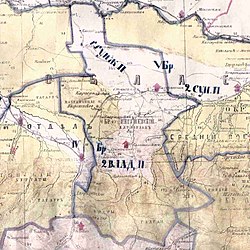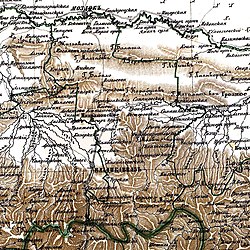Egikal
Egikal Эгикал | |
|---|---|
| Other transcription(s) | |
| • Ingush | Аьгикхаьлла |
 | |
| Coordinates: 42°50′01″N 44°55′05″E / 42.83361°N 44.91806°E | |
| Country | Russia |
| Federal subject | Ingushetia |
| Population | |
| • Total | 5 |
| • Subordinated to | Dzheyrakhsky District |
| Time zone | UTC+3 (MSK |
| Postal code(s)[3] | |
| OKTMO ID | 26620450146 |
Egikal (Russian: Эгикал; Ingush: Аьги-Кхаьлла, romanized: Ägi-Qälla, lit. 'Settlement of Ägi') is an ancient city-settlement in the Dzheyrakhsky District of Ingushetia. It is part of the rural settlement (administrative center) of Guli.[5] On its territory are many cultural objects of ancient and medieval Ingush architecture: cyclopean tower-type dwellings, five combat towers (Ingush: вӀов, vhóv), six semi-combat and fifty residential towers (Ingush: гӀала, ghāla). There are also a large number of different types of burial grounds (106 crypt burial grounds, 1 mausoleum) and three sanctuaries.[6] Currently, these objects and the entire territory of the settlement are included in the Dzheyrakh-Assa State Historical-Architectural and Natural Museum-Reserve and are under state protection.
Geography
[edit]


It is located 85 km south of the capital Magas and 25 km east of the district center Dzheyrakh. The nearest settlements are: in the north — Barkhane and Tori, in the east — Targim, in the southeast — Khamkhi, in the west — Leymi and Ozig.[7]
History
[edit]On the territory of the settlement exists a remnant of the Kura–Araxes culture known as the “Egikal burial ground”. It is located to the west of the settlement towards the Targim basin, on the southern slopes of the rocky range, and dates back to the end of the III millennium BC. The burial ground was discovered and studied by B.M. Khashagulgov in 1988.[8] Likewise, located on the territory of Egikal, are remains of more than 15 megalithic cyclopean dwellings dating from to the second half of the II millennium BC. — XV century AD.[9]
Demographics
[edit]In 1874, 1883, 1890, 1914 and 1926 censuses, the population of Egikal consisted entirely of ethnic Ingush people.[10][11][12][13][14]
References
[edit]- ^ Russian Federal State Statistics Service (2011). Всероссийская перепись населения 2010 года. Том 1 [2010 All-Russian Population Census, vol. 1]. Всероссийская перепись населения 2010 года [2010 All-Russia Population Census] (in Russian). Federal State Statistics Service.
- ^ "Об исчислении времени". Официальный интернет-портал правовой информации (in Russian). 3 June 2011. Retrieved 19 January 2019.
- ^ Почта России. Информационно-вычислительный центр ОАСУ РПО. (Russian Post). Поиск объектов почтовой связи (Postal Objects Search) (in Russian)
- ^ Итоги Всероссийской переписи населения 2020 года. Федеральная служба государственной статистики. Archived from the original on 2020-01-24. Retrieved 2023-04-16.
- ^ "ОБ УСТАНОВЛЕНИИ ГРАНИЦ МУНИЦИПАЛЬНЫХ ОБРАЗОВАНИЙ РЕСПУБЛИКИ ИНГУШЕТИЯ И НАДЕЛЕНИИ ИХ СТАТУСОМ СЕЛЬСКОГО, ГОРОДСКОГО ПОСЕЛЕНИЯ, МУНИЦИПАЛЬНОГО РАЙОНА И ГОРОДСКОГО ОКРУГА от 23 февраля 2009 - docs.cntd.ru". docs.cntd.ru.
- ^ Чахкиев 2003, pp. 132–133.
- ^ "Карта горной Ингушетии". Открытый Кавказ (in Russian).
- ^ Хашегульгов Б.М., Ростунов В.Л. 1991, pp. 59–63.
- ^ Агиров 2021, p. 208.
- ^ Терская область. Списокъ населенныхъ мѣстъ по свѣдѣніямъ 1874 года 1878, pp. 24 (PDF).
- ^ Списокъ населенныхъ мѣстъ Терской области: По свѣдѣніям къ 1-му января 1883 года 1885, pp. 17.
- ^ Статистическиія таблицы населенныхъ мѣстъ Терской области 1890, p. 54.
- ^ Списокъ населенныхъ мѣстъ Терской области: (По даннымъ къ 1-му іюля 1914 года) 1915, pp. 342–343.
- ^ Поселенные итоги переписи 1926 года по Северо-Кавказскому краю 1929, p. 406.
Bibliography
[edit]- Чахкиев, Д. Ю. (2003). Алироев, И. А. (ed.). Древности горной Ингушетии [Antiquities of Mountainous Ingushetia] (in Russian). Vol. 1. Назрань.
{{cite book}}: CS1 maint: location missing publisher (link) - Зейдлиц, Н. (1878). Терская область. Списокъ населенныхъ мѣстъ по свѣдѣніямъ 1874 года [Terek region. List of populated places according to 1874]. Списки населенныхъ мѣстъ Кавказскаго края (in Russian) (1st ed.). Тифлисъ: Типографія Главнаго управленіи намѣстника Кавказскаго. pp. 1–81.
- Терскій Областной Статистическій Комитет (1885). Благовѣщенскій, Н. А. (ed.). Списокъ населенныхъ мѣстъ Терской области: По свѣдѣніям къ 1-му января 1883 года [List of populated areas of the Terek region: According to information on January 1st of 1883] (in Russian). Владикавказъ: Типографія Терскаго Областнаго Правленія. pp. 1–78.
- Терскій Областной Статистическій Комитет (1890). Максимов, Е. (ed.). Сунженскій отдѣл [Sunzhensky Otdel]. Статистическиія таблицы населенныхъ мѣстъ Терской области (in Russian). Vol. 1. Issue 1. Владикавказъ: Типографія Терскаго Областнаго Правленія. pp. 1–85.
- Терскій Областной Статистическій Комитет (1915). Гортинскій, С. П. (ed.). Списокъ населенныхъ мѣстъ Терской области: (По даннымъ къ 1-му іюля 1914 года) [List of populated places in the Terek region: (as of July 1, 1914)] (in Russian). Владикавказъ: Электропечатня Типографія Терскаго Областнаго Правленія. pp. 2, 15–459.
- Северо-Кавказское кравое статистическое управление (1929). Поселенные итоги переписи 1926 года по Северо-Кавказскому краю [Settled results of the 1926 census in the North Caucasus region] (in Russian). Ростов-на-Дону: Отдел переписи. pp. 1–544.
- Хашегульгов Б.М., Ростунов В.Л. (1991). "Датировка куро-араксских погребений Эгикальского могильника". Тезисы докладов на конференции Археология на новостройках Северного Кавказа (in Russian). Грозный.
{{cite book}}: CS1 maint: location missing publisher (link) - Агиров, Т.А. (2021). Горная Ингушетия (in Russian). Москва: Перо.


 French
French Deutsch
Deutsch

